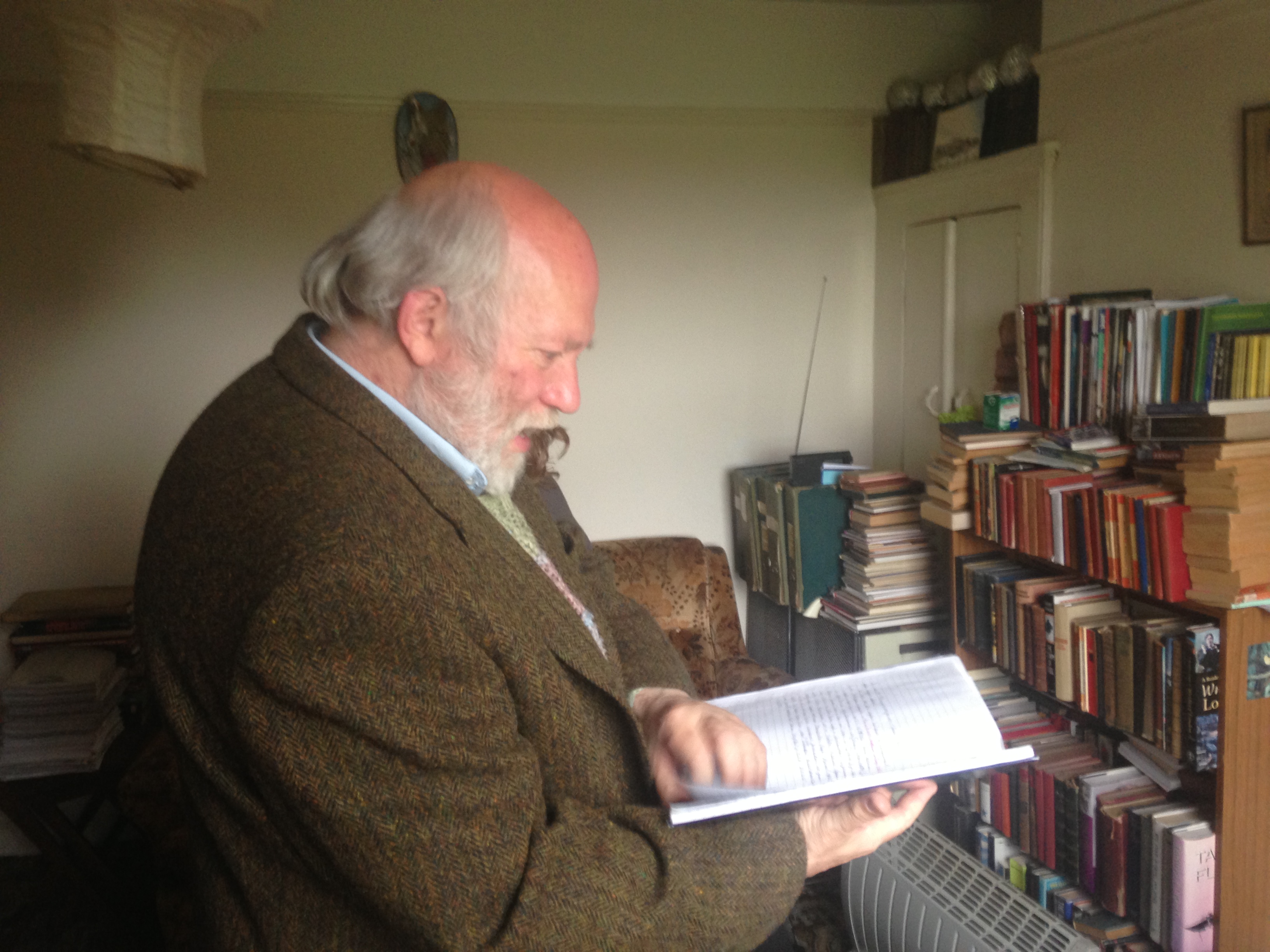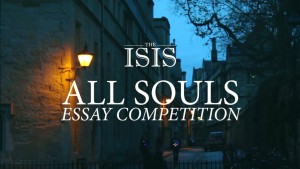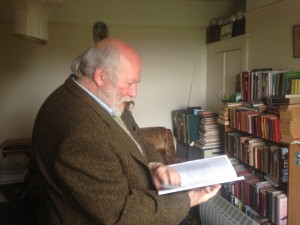
AD Harvey: ISIS meets the man behind the pseudonyms
by Philip Bell & Violet Brand | July 12, 2013
“What’s wrong with being an icon?” AD Harvey asks as we leave his flat in Stoke Newington, North London. He is a sixty-five year old historian, novelist, and poet who publishes twenty academic articles per year, but has only held short posts at universities in Leipzig, Germany, and Salerno, Italy. Harvey was relatively unknown outside academic circles until last month, when Eric Naiman wrote an article for the Times Literary Supplement exposing him as the man behind multiple articles and books written under six pseudonyms. So, when he sent a submission to ISIS titled “My Poetry” commenting: “If I’m famous this month, Isis readers might like to read the attached,” we were curious.
More striking than his writing under pseudonyms is that some of the content of his articles was deliberately erroneous. In an article by ‘Stephanie Harvey’, AD Harvey implied that Dostoyevsky had met Charles Dickens, and cited an obscure Dostoyevsky letter in a Russian archive. This went unchallenged, then was cited by others – eventually ending up in a prominent Claire Tomalin biography of Dickens and monographs by Malcolm Andrews and Michael Slater. Michiko Kakutani in her New York Times review of Tomalin’s biography described the account of the meeting as “remarkable”. Tomalin retracted her statements and apologised, saying that she was the victim of a scam. Excited Dickens scholars everywhere were disappointed and some, embarrassed.
This wasn’t the first time Harvey had written under a pseudonym. By 1985 he had published numerous articles, historical monographs and a novel, but felt that he was being rejected from some academic journals on name and reputation, rather than by the quality of his articles: “History [the academic journal of The Historical Association]… was turning down my stuff – not because there was anything wrong with it, but because it was by me!” Why would History want to reject him? Harvey speculates: “I’d never met Speck [the then editor]. It’s only a possibility, but it seems the only explanation, that he and certain other people had been annoyed by letters I’d been writing to the Times Higher [Educational Supplement], complaining about appointment systems and the way universities were clogging up.”

So in 1985 he sent an article to the academic journal History under the name ‘Stephen Harvey’. It survived peer review to be published in the next issue, with the title: ‘The Italian War Effort and the Strategic Bombing of Italy’. Having in his own head confirmed the idea that the rejection of ‘AD Harvey’ articles was unwarranted, he delivered the coup de grâce: he sent a 14-page chapter from one of his published books, altered to look like an article, under the name ‘Trevor McGovern’. This too survived peer review, by “two other experts teaching the period, none of them recognising, in spite of the fact that I write better English than they do” that it came from a published book. When it was revealed that the Trevor McGovern article was an act of gross plagiarism, Speck, “being hysterical on the subject, actually organised that the Trevor McGovern should be torn out and he provided a replacement [article] to be glued in”. The episode exposed History as “professionally incompetent” for reprinting a chapter from a book that, in Harvey’s view, all the referees should have known about.
***
Harvey seems to revel in the opportunity to tell us his story, and in the sudden blast of TLS-induced fame: “At the last count, [the article] features on 44 blogs and internet discussion groups,” he says eagerly. The TLS piece has been something like validation, for a “failed academic” (his words) tucked away in a flat in North London, publishing, writing, reading and researching in local libraries – but without, until this point, public recognition. It doesn’t seem to trouble Harvey that the recognition is for academic fraud.
He does take issue with the way the article was written: “I think Naiman actually hijacked someone else’s story, made himself the star of someone else’s story – mine, not his,” he says, before interrogating us on whether we feel “warm or cold” towards the AD Harvey presented in the article. Nevertheless, he thinks the piece can be read “both ways” – in favour of Harvey as well as against.
Harvey is intrinsically anti-establishment: anti the established journals, the established academics, and established institutions – which he regards as closed to outsiders, complacent and self-regarding. But this attitude is tinged with fondness for places like Oxford and Cambridge: “I was from a smaller town and a poor background and Oxford was sort of the dream for me.” He seems to revel in the opportunity to reminisce about Oxford in particular. His opening line, as we sit down in a dusty room piled high with books and antiques, is half-nostalgic: “For me every stone of Oxford is dulled by a failed hope, and, looking back, the only time that I actually really got off on the place was coming up for the interviews.”
In his final year studying History at St John’s College, Oxford, a literary agent expressed interest in a novel Harvey had been writing in his spare time; Harvey decided to be a writer. The obvious way of funding this career was by doing a PhD, in order to have three years’ income – in those days, academic grants were generous. “I didn’t become established as a novelist, but I fell in love with doing historical research.” He did his PhD at Cambridge, and began to apply for academic jobs: none were forthcoming. Eventually “after 11 years of Oxford and Cambridge, I decided it just wasn’t happening”; he “ran away to become a hippy, and lived in a squat and was an antique dealer for a couple of years.” But he kept on publishing.
***
In conversation, he keeps returning to a few core themes. One is that “academics don’t read” – evidenced by his repeated successes with pseudonyms, planting false information, plagiarising his own work, and publishing a comparative essay in which one of the texts compared did not in fact exist. The other is that his own productivity (and, not-so-softly implied, brilliance) hindered his chances of getting an academic post. Another, again, is that the academic appointments system is closed, biased, and filled with people interested primarily in promoting their careers.
These grievances, justified or not, are what underlie Harvey’s attempts at academic sabotage. Not all the pseudonyms had serious intent, he claims: Stephen Harvey and Trevor McGovern were invented to prove a point (first, to himself, then, to the academic establishment represented by Speck). But Stephanie Harvey and the Dostoyevsky-Dickens encounter was merely playful – an act of “jeu d’esprit”, he says. “Isn’t one allowed to have fun in life?” And the other Stephanie Harvey article, a comparison between work by Doris Lessing and Leo Bellingham (i.e. AD Harvey) – where the Bellingham short story didn’t exist, except in the footnotes of the comparative article – was an attempt to play with literary form. John Schellenberger, a pseudonym used “to puff my work” on historical approaches to literature, he justifies as, partly, “a debate with myself”.
We ask where the (rather odd, or oddly diverse) names come from. “I’m creative, I write novels, I wanted to be a novelist.” Trevor McGovern “For a Southern Englishman … suggests some polytechnic lecturer in a donkey-jacket, which was part of the point” while John Schellenberger recalls “an American girl I had a fling with at Cambridge a long time ago, called Jane Schellenberger… the name was in my head”. Ultimately, “These names, these stylish mannerisms, are actually part of being a writer.”
In the TLS article Naiman slowly peels back the layers of different but linked identities to reveal the shadowy figure of Harvey behind them, who is criticised for damaging the reputation of independent academics. The acts of sabotage, Naiman thinks, will only make journals more closed to independent historians like Harvey.
Harvey is keen to reject this: “That’s just a complete canard. When you make contact, they [the editors] can pursue the question of your existence.” What Harvey doesn’t seem to want to acknowledge is that an author’s existence is taken partly on trust: journal editors don’t have time to ferret out authorial identities.
When pushed on the subject, he concedes, “Yes I have to confess it [the hoaxing] suggests a certain style of maliciousness – and carelessness – for other people’s sense of right and wrong. But then what about their sense of right and wrong? I’ve got 40 years of unemployment to complain about.” He laughs.
And he revels in the title of academic terrorist. “Terrorism isn’t just bombs, it’s knowing where to put the bomb, how the system works, and you undermine the system by poking it in certain places. This is partly an exercise in figuring out where to poke and how to poke and how the poking really works.” Later, describing the hoaxing of the Dickensian, he returns to this analogy: “You get a taste for these things… what I really wanted to do [was work out] can you make two tons of explosive out of stuff from the garden centre?” It’s unclear whether, when digressing further into bomb-making, he’s intentionally extending the parallel or simply expressing enthusiasm for the subject. Either way, his conclusion is telling: “The more bombs you make, the more likely you are to blow yourself up, so that actual arithmetical possibility of making a ton of explosive and everything going wrong…”
***
Does Harvey have a point? He has certainly published a lot, despite (some academics might say, because of) his non-affiliation to a university. Some of his books have been genuinely well-reviewed. Collision of Empires: Britain in Three World Wars, published in 1993, received good write-ups in the Telegraph, the Guardian, the TLS, and several academic journals. And yet, Harvey says, he received no mention in the Annual Bulletin of Historical Literature (a Historical Association publication) between 1992 and 1995, despite two successful books coming out. “Retrospectively, if I’d ever needed a justification for what I’ve done, this would be it. These aren’t straight, honest, fair-dealing people.” He views it all as a conspiracy to suppress his name. And perhaps there is a closed-ness to the academic history establishment, an unwillingness to recognise the merits of work by someone who’s not ‘one of us’ – an unwillingness to appoint people who’ve come in late, who aren’t of the right generation.
But Harvey is perhaps a little guilty of over-thinking: he thinks the conspiracy of silence extends even to the TLS. “The week after [the article] came out, it was like the interviews at Oxford, I was on air, because I thought the whole letters page for the following week was going to be full of people writing in – mostly negative – but provided there was an opportunity to shit on everyone…” But there wasn’t. The only letter referencing the Harvey article was a short one, picking Naiman up on describing the spires of Oxford colleges (the spires in fact belong to the churches). Harvey suggests: “It’s possible that someone leaned on the TLS not to publish any more to do with it.” If this strains credulity, it also speaks of a man who’s had lots of time – perhaps too much time – to mull over the obstacles, real and perceived, in his own career.
***
Perhaps Harvey’s problem as an academic is that he has tried to cover too much. The interdisciplinary scope of his work is remarkable: a poet, a wide-ranging historian, a literary critic and a novelist. He describes himself, perhaps slightly tongue in cheek, as a “simultaneous genius”, but simultaneity may have been his downfall. His consensus-breaking attitude and his generalist approach merge so that his fictional and historical writing are not altogether separate. Combine a novelist and an historian and you get AD, Stephen and Stephanie Harvey, and Dostoyevsky meeting Dickens.
But, while Harvey may have dreamed of becoming the historian or novelist on everyone’s lips, what drives him still is a passion for literature and history. When we meet him, he is clutching a thick volume of Dickens; judging from his book collection, he reads what he wants. He used to keep lists of his articles under his pillow, but now has a small red notebook with three columns of article lists: “Accepted”, “looking” (searching for a publisher) and “cooking” (in the writing stage). Once the articles have been accepted he glues the pages down.
“The basic thing is I write what I want to write,” he says. He claims he has no longer has any reason to publish under pseudonyms, although he might still publish “some minor poetry or something” under a fake name. A line from the “My Poetry” piece he sent into ISIS in April gives a sense of his attitude: “I suppose my non-fiction work has an adopted voice… AD Harvey trying a bit too hard to sound like a scholar or a critic or a theorist… I have published non-fiction under [several] pseudonyms, each presumably with a different voice, though I confess they all sound to me like AD Harvey.”




